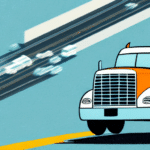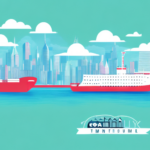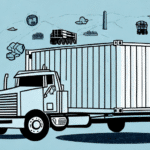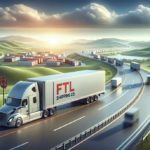What Does FTL Trucking Mean?
In the world of logistics and transportation, FTL trucking stands for Full Truck Load. It refers to a mode of transportation where an entire truck is filled with goods from a single customer or supplier. Essentially, FTL trucking is a type of freight service where customers pay for the space inside a truck, regardless of the weight or volume of the goods being transported.
The Advantages of FTL Trucking for Your Business
One of the primary advantages of FTL trucking is the faster and more efficient delivery of goods. Since the truck is dedicated to a single customer or supplier, it eliminates the need for multiple stops and transfers, thereby reducing the risk of damage or delays in transit.
Reduced Transit Times
With a dedicated truck, delivery times are significantly shorter compared to other shipping methods. This is particularly beneficial for businesses that require timely deliveries to meet customer expectations.
Enhanced Security
FTL trucking provides enhanced security for your goods. A dedicated truck minimizes the risk of theft or damage during transit. Additionally, many FTL carriers employ advanced tracking and monitoring systems, allowing you to monitor your shipment in real-time. This ensures that you are always aware of the location and status of your goods, enabling swift action in case of any issues.
Cost-Effectiveness for Large Shipments
FTL trucking is often more cost-effective for larger shipments as it leverages economies of scale, reducing the overall transportation costs per unit. This makes it an attractive option for businesses shipping high volumes of goods.
How FTL Trucking Works: A Comprehensive Guide
FTL trucking follows a well-defined process that begins with the customer booking a full truckload with a shipping company. The shipper then prepares the goods for transportation, which may involve packaging, labeling, and documentation. The FTL carrier arrives at the shipper's location to pick up the goods and transport them to their final destination.
Booking and Preparation
The process starts with booking the FTL service. Shippers must provide detailed information about the shipment, including dimensions, weight, and any special handling requirements. Proper preparation ensures a smooth transportation process.
Transportation and Compliance
During transportation, the carrier must comply with specific regulations regarding safety, weight limits, and documentation. This ensures that the shipment adheres to all federal and state laws, maintaining the integrity and legality of the transport process.
Delivery and Unloading
Upon reaching the destination, the goods are unloaded and delivered to the receiver. Efficient unloading processes are crucial to maintaining the quality of the goods and ensuring timely delivery.
Understanding the Different Types of FTL Trucking
FTL trucking can be categorized based on the nature of the goods being transported. Understanding these categories helps businesses choose the right type of FTL service for their specific needs.
Dry Van Trucking
Dry van trucking is the most common type of FTL trucking, where goods are transported in a standard enclosed trailer. It's suitable for a wide range of freight, including electronics, apparel, and non-perishable goods.
Flatbed Trucking
Flatbed trucks are used for oversized and heavy cargo that cannot fit in standard trailers. They are ideal for transporting construction materials, machinery, and other bulk items.
Refrigerated Trucking (Reefers)
Refrigerated trucks are designed to transport perishable goods at controlled temperatures. This includes food, pharmaceuticals, and other temperature-sensitive items. Maintaining the right temperature ensures the quality and safety of the goods.
Specialized Equipment
Specialized equipment, such as tankers and lowboy trailers, are used for transporting hazardous or oversized loads. These specialized trucks ensure that such goods are transported safely and in compliance with regulations.
FTL vs. LTL Trucking
It's important to differentiate FTL from Less Than Truckload (LTL) trucking, where multiple shipments from different customers are consolidated into one truck. FTL trucking involves a single shipment that takes up the entire truck, making it more cost-effective for larger shipments.
The Cost of FTL Trucking: What to Expect
The cost of FTL trucking can vary based on several factors, including distance, weight and size of the shipment, fuel prices, and seasonality. Typically, FTL carriers charge a flat fee for the full truckload, which may be negotiable based on market conditions and volume pricing.
Factors Influencing Cost
- Distance: Longer distances generally incur higher costs due to increased fuel consumption and driver time.
- Weight and Size: Heavier and larger shipments may require specialized equipment, affecting the overall cost.
- Fuel Prices: Fluctuations in fuel prices can significantly impact transportation costs.
- Seasonality: Demand for FTL trucking can vary seasonally, affecting availability and pricing.
Additional Fees
Additional services such as loading and unloading, expedited delivery, and special handling may incur extra fees. It's important for businesses to discuss these potential costs with their carriers to avoid unexpected expenses.
Optimizing Transportation Costs
Businesses can optimize their transportation costs by negotiating rates with FTL carriers, consolidating shipments, and utilizing intermodal transportation options. Implementing efficient inventory management practices can also contribute to cost savings.
Tips for Choosing the Right FTL Trucking Company
Selecting the right FTL trucking company is crucial to ensure the safe and efficient transportation of your goods. Here are some tips to guide your selection process:
Check Safety Records and Reputation
Evaluate the company's safety records and overall reputation in the industry. A carrier with a strong safety record is more likely to handle your goods responsibly.
Verify Equipment and Compliance
Ensure that the carrier's equipment is well-maintained and suitable for your specific shipment needs. Additionally, verify that the company complies with all regulatory requirements, including licensing and insurance.
Assess Customer Service and Support
Responsive customer service is essential for addressing any issues that may arise during transportation. Choose a carrier that offers robust support and clear communication channels.
Evaluate Geographic Coverage and Capacity
Consider the carrier's geographic coverage to ensure they can transport your goods to the desired locations. Additionally, assess their capacity to handle your shipment volume, especially during peak seasons.
Consider Sustainability Practices
With the growing emphasis on sustainability, choosing a carrier that prioritizes eco-friendly practices can align with your business values and appeal to environmentally conscious customers.
Pros and Cons of FTL Trucking Compared to Other Shipping Methods
FTL trucking offers several advantages over other shipping methods such as parcel or Less Than Truckload (LTL) shipping, but it also has its drawbacks.
Advantages of FTL Trucking
- Flexibility: FTL trucking provides more flexibility in pickup and delivery schedules, allowing businesses to plan their shipping activities more effectively.
- Faster Delivery Times: With no need to make multiple stops, FTL shipments often arrive faster than other shipping methods.
- Enhanced Security: Dedicated trucks reduce the risk of theft or damage, providing better security for your goods.
Disadvantages of FTL Trucking
- Cost for Small Shipments: For smaller shipments that do not fully utilize the truck's capacity, FTL trucking may be less cost-effective.
- Limited Availability: During peak shipping seasons, securing an FTL carrier can be challenging, potentially leading to longer wait times.
- Higher Fixed Costs: The fixed costs of an entire truckload may not be justified for smaller volumes.
Common Misconceptions About FTL Trucking Debunked
Several misconceptions about FTL trucking can lead to confusion and misinformed decisions:
FTL Trucking is Only Suitable for Large Shipments
While FTL trucking is ideal for large shipments, it can also be cost-effective for smaller shipments, especially when compared to other expansive shipping methods.
FTL Trucking is Not Environmentally Friendly
Contrary to popular belief, FTL trucking can be more environmentally efficient than other shipping methods. By transporting goods directly without multiple stops and transfers, FTL reduces fuel consumption and emissions per unit of cargo.
FTL Trucking is Unreliable
FTL trucking companies often adhere to strict schedules and delivery timelines, ensuring shipments arrive on time. Advanced tracking technologies further enhance reliability by providing real-time updates on shipment status.
How to Optimize Your Shipping Strategy with FTL Trucking
Optimizing your shipping strategy with FTL trucking involves several key practices:
Efficient Route Planning
Collaborate with your carrier to plan efficient routes and schedules, minimizing transit times and reducing costs.
Utilize Technology
- GPS Tracking: Monitor your shipments in real-time to ensure timely deliveries and address any issues promptly.
- Real-Time Analytics: Use analytics to gain insights into shipping performance and identify areas for improvement.
- Automated Billing: Streamline your billing processes to reduce administrative overhead and errors.
Optimize Packaging and Labeling
Invest in efficient packaging and accurate labeling to reduce the risk of damage and errors during transportation. Proper packaging also maximizes space utilization within the truck.
Expand Customer Base and Competitiveness
Effective use of FTL trucking can help businesses expand their customer base by enabling faster and more reliable deliveries, thereby improving overall competitiveness in the market.
Sustainability Considerations
Consider the environmental impact of your shipping. FTL trucking can be more eco-friendly by reducing per-unit emissions. Choose carriers that use fuel-efficient trucks and prioritize sustainability practices.
The Impact of Technology on FTL Trucking and the Logistics Industry
Technology has transformed the FTL trucking and logistics industry, leading to increased efficiency and improved services:
Advanced Tracking and Route Optimization
Advancements in GPS tracking and route optimization software allow carriers to operate more efficiently, reducing transit times and fuel consumption.
Real-Time Data Analytics
Real-time data analytics provide carriers and shippers with actionable insights into shipping performance, helping to identify bottlenecks and optimize operations.
Autonomous Trucks and Blockchain
The rise of autonomous trucks and blockchain technology is set to revolutionize the industry by enhancing transparency, security, and efficiency in the transportation process.
Challenges Posed by Technology
While technology offers numerous benefits, it also presents challenges such as data privacy concerns and the need for robust cybersecurity measures to protect sensitive information.
Conclusion
FTL trucking is a vital mode of transportation for businesses that need to transport large quantities of goods quickly and efficiently. It offers several advantages over other shipping methods, including faster delivery times, greater flexibility, and cost-effectiveness for larger shipments. Choosing the right FTL trucking company is crucial to ensure the safe and timely delivery of your goods. By optimizing your shipping strategy with FTL trucking and leveraging technology, businesses can improve their competitiveness and expand their customer base. As technology continues to evolve, the FTL trucking and logistics industry will likely undergo further changes and innovations in the years to come.




















